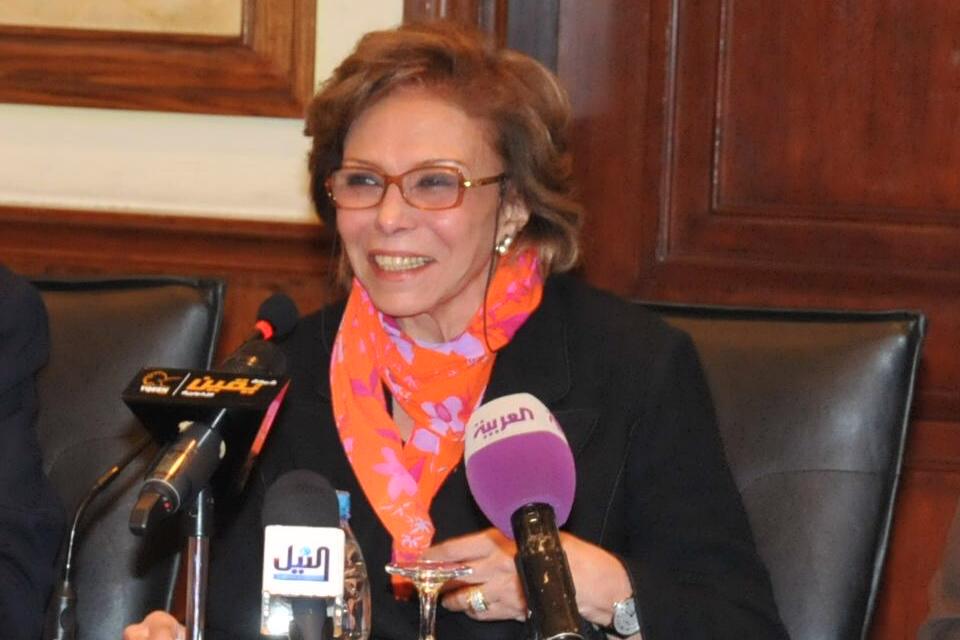By Safaa Abdoun
CAIRO: Within hours of his much-anticipated release from state security detention, Wael Ghonim, founder of Facebook page ‘We are all Khaled Said,’ was delegated by thousands of Facebook users to speak on behalf of the young people demonstrating in Tahrir Square.
His first television appearance on the primetime show “Al-Ashera Masaan” hosted by Mona El-Shazly ended abruptly when he broke down in tears upon seeing for the first time pictures of those killed in protests since Jan. 25.
Over 140,000 Facebook users joined the group “I authorize Wael Ghonim to speak on behalf of young Egyptian revolutionaries.”
The lack of a representative, whether in the Council of Wise Men or in Sunday’s talks with Vice President Omar Suleiman, has been a major concern, especially for the thousands who are determined to stay in Tahrir Square until President Hosni Mubarak steps down.
“We do not know the young people who met the vice president … They are seeking fame and do not represent us in any way,” said Ahmed Maher, head of the April 6 Youth Movement in a telephone interview from Tahrir Square.
Ghonim, Google’s regional marketing manager, was kidnapped in the early hours of Friday Jan. 28 (dubbed the Day of Anger) at around 1 am as he was trying to flag down a taxi. He was surrounded by four men who dragged him into a car, according to his account on Dream TV.
For 12 days he was blindfolded and had no idea what was going on in the outside world, how the protests went on Friday and more importantly, what they have accomplished.
“What happened to me is a crime; if you want to arrest me there is a law … I’m not a terrorist or a drug dealer so the Emergency Law can’t be applied on me,” he said.
Ghonim described what happened as the “revolution of the internet youth, which then turned into the revolution of Egypt’s youth, which turned into the revolution of all Egyptians.”
“We are not traitors, what moved us is our love for Egypt,” he asserted, pointing out that he and many others are well-off and want nothing but the welfare of their country.
The only thing he regretted throughout his detention is the revelation that he was the administrator of the Khaled Said group on Facebook.
“I’m not a hero,” he said. “I was merely writing on the keyboard while others out there were putting their lives on the line.”
Under state security detention, Ghonim said he was treated well and wasn’t subjected to any physical assault. The insults hurled at him during the early interrogations, he said, stemmed from the fact that officials were convinced that foreigners mobilized, brainwashed and funded the protesters.
“[Inside] I felt that there are people who love Egypt and want to do something for it in the same way I love it and want to do something, but due to the existing political regime we both seem locked in conflict,” he explained.
“We have to demolish this political regime which does not allow us to speak out,” he said, explaining that anyone who does is considered an outlaw or is planning to overturn the regime.
When asked whether he thinks he was released after public pressure, Ghonim said that he had already sensed a change in the treatment of the officers to him once they felt that he is only an Egyptian who wants to do something for his country.
Ghonim met the newly-appointed Minister of Interior Mahmoud Wagdy before he was released. “I sat with him man to man … we are both equals … he is strong and I’m strong,” he explained, noting that “the youth did this.”
The newly-appointed secretary general of the National Democratic Party, Hossam Badrawi, drove Ghonim home upon his release.
Ghonim said that he highly respects Badrawi which is why he advised him to leave the NDP, the party which has “destroyed our country,” and form another party. “I never want to see another NDP logo in the street again,” he said.
Ghonim said that it is time to step back and think of the following: How to restore the dignity of Egyptians, how to fight all forms of corruption on all levels and how to instill Egypt’s youth with a sense of loyalty to their country.
“This is not the time to settle personal scores, it’s not the time to divide the cake — a lot of politicians will know what I mean by that — and finally, it’s not the time to enforce ideologies,” he said.
“It’s time to demand our rights and think of the welfare of our country,” he added.
Ghonim wrapped up by pointed out two main obstacles: “First, we don’t communicate,” he said, referring to how there is no dialogue between the people and the regime. “And second problem is that there is no trust.”





